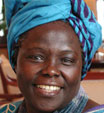 Wangari M. Maathai, world-renowned environmentalist and winner of the 2004 Nobel Peace Prize, will give a talk titled “The Greenbelt Movement in Africa: Mobilizing Ordinary People to Improve the Environment and Their Day-to-Day Lives” on Oct. 25 from 11 a.m. to 12:30 p.m. in St. Joseph Memorial Chapel at the College of the Holy Cross. The talk is free and open to the public.
Wangari M. Maathai, world-renowned environmentalist and winner of the 2004 Nobel Peace Prize, will give a talk titled “The Greenbelt Movement in Africa: Mobilizing Ordinary People to Improve the Environment and Their Day-to-Day Lives” on Oct. 25 from 11 a.m. to 12:30 p.m. in St. Joseph Memorial Chapel at the College of the Holy Cross. The talk is free and open to the public.
Maathai is the founder of the Green Belt Movement, which, through networks of rural women, has planted more than 30 million trees across Kenya since 1977. The mission of the grassroots, nongovernmental organization is to create a society of people who consciously work for continued improvement of their environment and a greener, cleaner Kenya.
In her memoir, Unbowed (Knopf), released Oct. 3, Maathai describes her persistent struggle for democracy, human rights, and environmental conservation, efforts that have made her internationally recognized. She is also the author of The Green Belt Movement: Sharing the Approach and the Experience (Lantern Books, 2003).
Maathai was born in Nyeri, Kenya, in 1940. She is the first woman in East and Central Africa to earn a doctoral degree. She obtained a degree in biological sciences from Mount St. Scholastica College in Atchison, Kan. (1964). She later earned a master of science degree from the University of Pittsburgh (1966). She pursued doctoral studies in Germany and the University of Nairobi, where she also taught veterinary anatomy. She lives and works in Nairobi.
In 1986, the Green Belt Movement established a Pan African Green Belt Network, which has taught more than 40 people from other African countries the Green Belt Movement’s approach to environmental conservation and community building. In 2002, she was elected to Kenya’s Parliament in the first free elections in a generation, and in 2003, she was appointed assistant minister for the environment.
Maathai is the first woman in Africa to be awarded the Nobel Peace Prize. The Nobel committee recognized Maathai for her contribution to sustainable development, democracy and peace. “Peace on earth depends on our ability to secure our living environment,” reads her citation. “Maathai stands at the front of the fight to promote ecologically viable social, economic and cultural development in Kenya and in Africa. … Maathai stood up courageously against the former oppressive regime in Kenya. Her unique forms of action have contributed to drawing attention to political oppression — nationally and internationally.”
In 2005, Maathai was named by Time magazine as one of the 100 most influential people in the world and by Forbes magazine as one of the 100 most powerful women in the world.
The event is funded by the Lilly Vocation Discernment Initiative at Holy Cross under a grant from the Lilly Endowment, Inc., and the Environmental Studies and Women’s and Gender Studies programs.
Wangari Maathai, 2004 Nobel Peace Prize Winner, to Give Talk at Holy Cross
Read Time
2 Minutes

